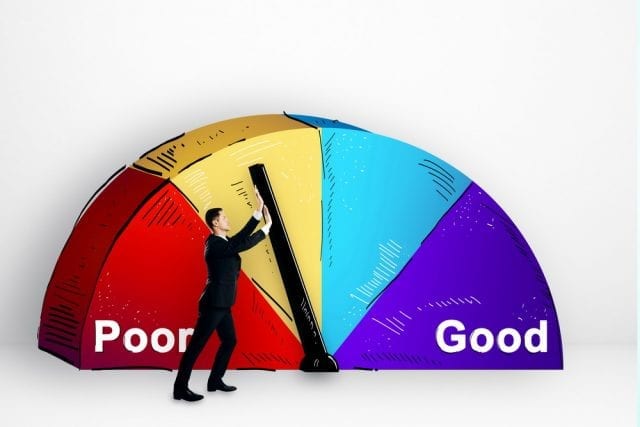
We live in a world that makes it exceedingly difficult to get by without some form of credit. Even if the only credit you have to your name is a revolving credit card from a local department store, you are participating in a much larger financial system. You are part of the global credit system.

Did you know that your credit history impacts many areas of your life? How you use credit tells a variety of individuals and organizations a lot about you. You might be interacting with some of those organizations without realizing they have taken a look at your credit history.
Below are three very real ways that your credit history impacts your life. As you read about each one, keep in mind the importance of learning how to build good credit. A strong credit history along with a solid credit score could have a positive impact on your life.
1. Your Ability to Borrow

If you are like most people, you already know the first point. Your credit history impacts your ability to borrow. Consider the fact that creditors look at your full and complete credit report when determining whether or not to loan you money. Also, note that creditors can, and often do, contact all three of the major credit reporting agencies to check on your history.
A full and complete credit report includes two primary components: your credit score and your credit history. The former is a three-digit number derived from a complicated mathematical equation. Believe it or not, that number is fairly accurate in predicting how likely you are to default on new credit within the first several months. The higher the number, the lower your chances of defaulting.
There are two different credit scores commonly used in the United States. One is the FICO score while the other is the VantageScore. Credit scores are divided into different categories, as follows:
- 800 to 850 – Exceptional
- 740 to 799 – Very good
- 670 to 739 – Good
- 580 to 669 – Fair
- Under 580 – Poor.
According to Investopedia, most consumers’ credit scores are in the Fair range. Being in that range doesn’t necessarily mean you would be prevented from borrowing, but the lower your score, the more important your credit history becomes.
Your credit history details all of your accounts, how much you owe on them, and your history of payments. Needless to say that borrowers look at all of this information in an attempt to understand your creditworthiness. The stronger your credit report, the more likely you will be able to borrow. You will also get more favorable interest rates and terms if your report is exceptionally positive.
2. Your Car Insurance Rates

Car insurance companies look at a laundry list of items in order to determine how much risk you present as a driver. While insurance companies cannot see your full credit report, they can see a modified version that helps them understand how you use credit. Any sign of financial irresponsibility suggests that you might also be irresponsible behind the wheel.
Insurance premiums are really nothing more than monetary representations of risk. Car insurance companies always have to assess their level of risk when issuing policies.
For example, there is always a risk that a driver will total his car within a couple of years of purchase. The amount of money that the driver has paid in monthly premiums will not cover the cost of replacing his car. Thus, the insurance company stands to lose quite a bit of money on his claim. This is why insurance companies look at so many factors when trying to determine how responsible a driver is.
In practical terms, this means drivers with poor credit histories also tend to pay higher insurance rates. Poor credit history is not entirely to blame, but it is a contributing factor. Your financial troubles could be contributing to your high car insurance rates.
The good news is that most states prohibit insurance companies from relying too heavily on credit scores and histories when setting premiums. Those same laws also prevent insurance companies from seeing personal information that is not relevant to assessing risk levels. So while your credit history does play a role in your insurance rates, it’s not the biggest thing you have to worry about. You should worry more about your driving record.
3. Your Ability to Get a Job

Just like car insurance companies, employers are able to see a modified version of your credit report. Most states prohibit employers from using that information as the primary basis for hiring or firing, but they can still consider it alongside other information.
One of the things employers look at is a potential hire’s ability to pay his bills on time. Paying one’s bills is considered a fundamental principle of adult responsibility. As the thinking goes, someone unable to keep up with his bills might also have difficulty managing work responsibilities. Of course, there are other issues to consider.
For example, certain kinds of jobs require a high degree of financial responsibility. Think jobs like a bank teller, retail store manager, accountant, and payroll clerk. Workers applying for such jobs are the most likely to be impacted by poor credit history. Yet even jobs with no financial responsibilities attached can be out of reach if your credit history is unfavorable.
These three areas demonstrate why it is so important to build good credit and maintain a positive credit history. How we use credit reveals how responsible we are in other areas of life. If your credit is not so good, it is probably impacting areas of your life you do not even know about. It is time to clean things up.
Start by developing a plan to pay your bills on time. Then work on reducing your debt. Once your monthly bills and debts are under control, you can start rebuilding your credit with a secured credit card or a personal loan.








